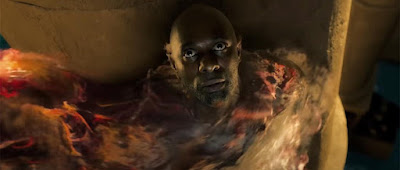George Miller’s Three Thousand Years of Longing is stories within stories within stories. It’s about a woman—a professor of narrative, no less—who gets caught up in a fantasy story of her own. On a trip to a conference in Istanbul, she takes a neat little blue glass bottle back to her hotel room. There she discovers her souvenir contains a djinn who promptly offers her the customary three wishes. Being a learned reader of myths and fables, she wisely demurs at first, all too aware that stories about wishes are always, as she says, “cautionary tales.” And so he sets out to win her trust by telling her tales of his life. She’s bound to this mythical being through the rules of his existence, and drawn deeper into his spell by the magic of his stories, and his willingness to hear hers. The latter are more familiar—an imaginary friend, an illness, a faded relationship. Tilda Swinton plays her with a sturdily mousy fragile determination, as she explains how she’s settled into the disappointments and satisfactions of her life with what she claims is contentment. That’s her story, at least.
His stories are where the fantasy takes flight. Idris Elba plays the djinn with a stone-faced rubbery surrealism, literally smoldering from the ears or fingertips at times as he lounges in a hotel robe in our present, while spinning phantasmagoric narratives of his past. Miller brings these tales alive with vivid imagination casually deployed. (It’s worth remembering the man who gave us Mad Max and Babe and Happy Feet loves framing his stories as legends and fables remembered and recounted.) These sequences swoop into imagined histories populated with interesting faces and off-hand unreality—swirling spells, a stringed instrument that partially plays itself, a spider-wizard who hatches from the head of a guard, an ostrich-man whispering secrets into a genie’s ear. They cross ancient sex and violence—battlefields and bedrooms—to find the djinn constantly close, and yet so far, from the release of freedom in the midst of their fantasy melodramas. Somehow these kings and queens and warriors and slaves and bards can’t quite get to that third wish that will let him go. In these twisty narratives, Miller finds an earthiness, a sensuality to the images, a mythopoeic scope to the pronouncements, and a beguilingly sly dark humor to the whimsy of it all that keeps us drawn in while on edge. How much of this is to be taken at face value, and how much is mere seductive doodling around the edges of our collective memories of epic poetry past?
It’s compellingly drawn out on that razor’s edge of disbelief, enough to invest in while resolutely meta-textual, teetering its way toward an earnest outcome. That’s fitting considering the audience for these tales within the film itself. The professor listens eagerly. We’ve seen her semi-solitary existence, enlivened by books and the occasional colleague. She lives for the ways these ancient modes of storytelling reverberate and resonate even in our more scientific age that’s dimmed their spirits. Here she’s met her match for personifying the magic of fiction. Forget wishing; maybe that’s enough. They’re each Scheherazade by way of Joan Didion—telling stories in order to live. Miller brings out this connection between the central pair. They both need the fictions—or are they their realities?—to exist for each other. Come to think of it, it’s also how they exist for each other. (The possibility that it’s all in her head is held out in a tantalizingly unresolved ambiguity that remains plausible throughout without undercutting the sentiments within.) The tellers, and the tellings, have power.
Isn’t that an immortal truth of stories? We create them. They exist as long as they are passed along, and by our telling and retelling of them, they keep something about our humanity alive long after we depart. How poignant, then, to watch an embodiment of stories brought forth anew into our world—and see that he might survive despite modernity’s ambient distractions’ best efforts to sap his strength. He explains himself without demystifying his magic. If nothing else, his audience of one remembers why she loved such a thing—deeply, truly, beautifully. The longing at the movie’s core is for a fantasy’s freedom, to be heard and understood and loved. And it’s in the curious place within each of us that always yearns to be satisfied by a story well-told.


No comments:
Post a Comment